First Peoples 12
Grade 12
Traditional Territories of the B.C. First Nations and Relationships with Land
Sample topics:
-
Traditional territories of local First Nations. Traditional territories may overlap.
Search for any BC First Nations Community, eg. Squamish
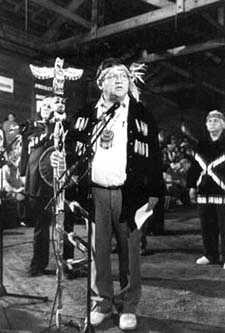
Joe Mathias, long-time chief of the Squamish Nation, 1990. Ian Smith/Vancouver Sun
- Difference between political boundaries and traditional territories
- How the land shapes and influences First Peoples worldview (e.g., stewardship, cultural practices of the land, relationship to language)
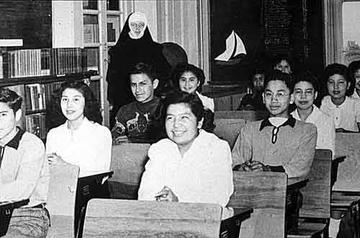
Grade 8 and 9 students at St Mary's residential school, Mission, c 1950. Bert Clifford/Mission Community Archives
- Cultural and linguistic diversity that exists among B.C. First Peoples
Role of oral tradition for B.C. First Peoples
Sample topics:
- Elders as knowledge keepers who share the history of their people and lands
- Oral tradition as valid and legal evidence (e.g., Delgamuukw v. B.C., 1997; ownership of property, territory, and political agreements)
- Stories, songs, music, and dance as forms of narrative
- Oral tradition shapes identity and connects to the past, present, and future.
- Oral tradition provides guiding principles for living.
- Indigenous concept of time (e.g., spiralling versus linear)
Impact of Historical Exchanges of Ideas, Practices, and Materials among Local B.C. First Peoples and with Non-indigenous Peoples
Sample topics:
- Trade networks and routes
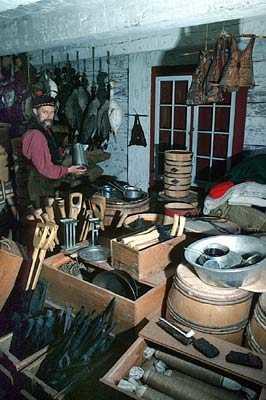
Trading room at historic Fort Langely. Rick Blacklaws photo
- Settlement and migration patterns
- Maritime and land fur trade
- Exchange of goods, technology, economy, knowledge
- Industries
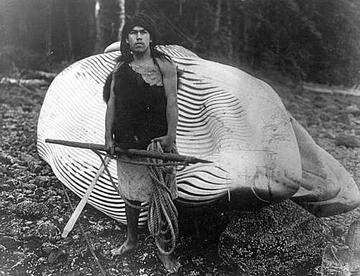
Sei whale, caught at Alert Bay, 1905, by Archie Seymour and others. VMM
Provincial and Federal Government Policies and Practices that have affected, and continue to affect, the responses of B.C. First Peoples to Colonialism
Sample topics:
- Indian Act and its amendments
- Enfranchisement
- White Paper, Red Paper (Alberta), Brown Paper (B.C.)
- Residential Schools, including federal apology, Truth and Reconciliation Commission and Report
- Treaties, including fishing and hunting rights
- Sixties Scoop and foster care system
- Canada’s constitution (e.g., Meech Lake and Charlottetown Accords, Canadian Charter of Rights and Freedoms)
- UN Declaration on the Rights of Indigenous Peoples
Resistance of B.C. First Peoples to Colonialism
Sample topics:
- Political actions of local and provincial indigenous groups (e.g., Union of British Columbia Indian Chiefs, Métis Nation British Columbia)
- Tsilhqot'in War
- Gustafsen Lake
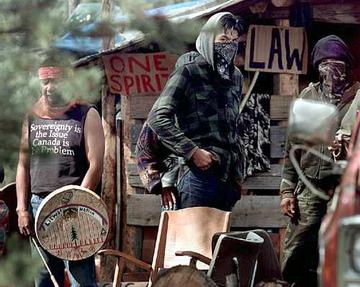
Defiant lookouts at Gustafsen Lake, 1995. Aboriginal people and their supporters occupied buildings during a land dispute. Mark van Manen/Vancouver Sun
- Idle No More
- Judicial cases (e.g., Calder, 1973; Guerin, 1984; Sparrow, 1990; Van der Peet, 1996)
- Cindy Blackstock and the Canadian Human Rights Tribunal ruling
- Ecological justice and protests (e.g., pipelines, logging, hydraulic fracturing, liquefied natural gas, hydroelectricity)
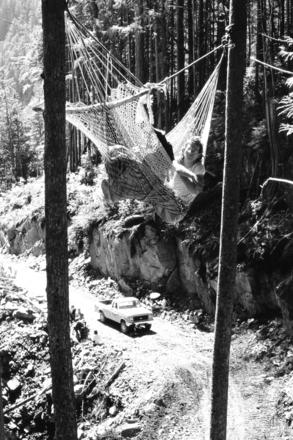
In 1988 during the campaign to stop Fletcher Challenge from building a logging road in Sulphur Passage, protesters strung hammocks and suspended themselves above areas where road builders planned to blast. Mark Hobson photo, courtesy of Clayoquot Action
Role and Significance of Media in Challenging and Supporting the Continuity of Culture, Language, and Self-determination of B.C. First Peoples
Sample topics:
- Portrayal and representation of First Peoples in media
- Repatriation and ownership of cultural objects
- Ethics of copyright, patent rights, intellectual property, and appropriation
Commonalities and Differences between Governance Systems of Traditional and Contemporary B.C. First Peoples
Sample topics:
- Traditional governance
- Band system
- Land claims and self-governance
Contemporary Challenges Facing B.C. First Peoples, including Legacies of Colonialism
Sample topics:
- Missing and murdered women
- Stereotypes and institutionalized racism
- Intergenerational trauma
- Judicial and correctional system
- Child welfare system
- Conditions on reserves (e.g., water, housing, education)
